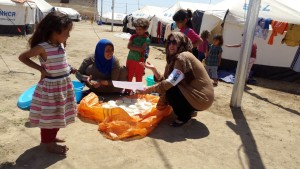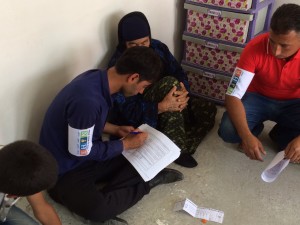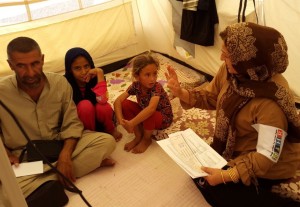Because of military operations that took place after 1/4/2016 in areas of Makhmour District, many families have displaced to safer areas including the Sub district of Dibega. Where reports of relevant organizations including IOM on displacement of (680) families to the Sub district in March due to armed conflicts that took place in nearby areas. As a result of field survey and individual and collective interviews conducted by the rapid search team of our Organization to community members in Makhmour District \ Dibega Sub district (Dibega Camp), and of both genders to identify their needs. Indicates that these families lack the most basic elements of a decent life, and have no shelter or any source of living, and that all these families in the camp in need of urgent assistance (such as food and non-food assistance, health services, safe drinking water, and provision of educational institutions). In addition to their economic situation below the level of poverty line, because of widespread of unemployment and lack of job opportunities, generate the money needed to buy their daily needs.
NIHR strives to meet the needs of the most vulnerable people. who have been exposed to the crisis, in accordance with the principles of humanitarian standards and agreed with CA Organization containing (appropriate and effective humanitarian response to identify their needs and in due time, an evaluation in location of IDPs to avoid causing them any harm if they exit the camp, respect for cultures and traditions and the preservation of human dignity, especially that the IDPs from villages, neutrality in choosing the families covered by the distribution by choosing the IDP families finally, for being the most needed for provided assistance, communication and participation by the targets with the field survey team).
Needs:-
Through field surveys and individual interviews with IDPs in the camp, have assessed the necessary needs, for being living in tents not suitable for housing, including:
Food:- they are in need for monthly food constantly as a short-term plan consists of basic food such as rice – flour – sugar – tea – oil, in addition to providing money that can cover the costs of buying the necessary daily food needs.
Humanitarian relief items: – in need to provide household items, covers, in addition to the kitchen items and electrical appliances they need, especially in the summer (air coolers – fridges), as well as money for meting the essential needs.
Health:- in need to provide hygiene continuously, in addition to providing bathrooms and WC, adapted to humanitarian standards for women and men separately, providing health centers and units with all the necessary medicines to provide medical services, in addition to finding appropriate and sustainable mechanism for waste disposal.
The social and economic situation:
IDP families in the District (Dibega Camp) desperately in need for (money), so they can spend on filling the needs of daily necessities, that the most of them are out of work because of displacement, loss of livelihood, mostly because of displacement and armed conflicts.
Gaps:-
Lack of an emergency response and attention by relevant government institutions.
- Failure to meet promises made by some international and local organizations for IDP families to providing services.
- The lack of sustainability and the rapid response by relevant organizations concerned with the issue.
| # | No. of targets | No. of families | Total no. of children | No. of children(Male) | No. of children(Female) |
| 1 | 1155 People | 209 families | 694 children | 375 child | 319 child |
Justifications:
IDP families in the District (Dibega Camp) are in need to provide basic services to them, because of their non-availability in the camp, and that may be the cause of increasing their humanitarian, health, and educational suffering, if it is not provided to them. In addition to the limited capacities of the camp management and their inability to provide most of the required needs by IDPs.





